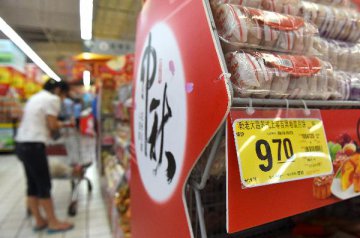
中秋剛過,不知各位吃的什麼餡的月餅?
往年被黑的五仁君月餅,今年光榮登上月餅銷售前三甲的名單。
作為吃貨的小編關心的是什麼餡的月餅好吃。
經濟學家們就不一樣了。
最近《經濟學人》雜誌發文表示月餅是瞭解中國經濟領域的風向標。
下面同小編一起來看看,經濟學家是如何從月餅中看經濟的吧。
月餅可謂是最具爭議的食物之一了。有人說月餅是中秋節必吃的美味,也有人覺得月餅太幹、太膩、卡路里高。
不過,經濟學家的角度就完全不一樣了,他們覺得月餅是消費、創新、腐敗和灰市交易領域的風向標。
MOONCAKES are among the most divisive treats. For some the chewy pastries are delicacies on which to gorge for the Mid-Autumn Festival, a Chinese holiday that falls this year on September 24th. For others they are dry, dense and full of calories. But for economists they are something else entirely: an indicator of important trends in consumption, innovation, corruption and grey-market trading.
月餅之所以能成為風向標,原因就是大家送禮都送月餅啊。
中秋節前,企業給員工發月餅;生意夥伴互贈月餅。
總之中國人很愛月餅了。
除了對月餅的愛,更重要的是月餅是經濟狀況的晴雨錶。
而今年令人振奮的是,即使是中美貿易局勢吃緊,中國烘焙協會預計今年月餅銷量仍將穩步上升5%。
Mooncakes play this role because of their status as gifts. Ahead of the mid-autumn holiday, companies give them to employees; business contacts exchange them. Consumption of mooncakes is thus less a reflection of whether people enjoy the pastries, likened by some to edible hockey pucks, and more a measure of the health of the economy. So it is heartening to know that, amid rising trade tensions with America, the Chinese bakery association has forecast that sales of mooncakes will rise by a solid 5-10% this year.
一些人擔心,中國消費者在債務不斷增加的壓力下,會選擇消費低價商品。
但是消費者們依然比較喜歡高價的各式各樣創意月餅而不是傳統的蛋黃月餅。
今年香格里拉酒店酒店推出了藍莓乳酪月餅,收穫大批粉絲。哈根達斯門口排著長隊買冰激淩月餅。
今年至少有三十多家上市食品公司推出月餅,企圖從20億美元的月餅市場上分一杯羹。
Some observers fret that Chinese consumers, burdened by rising debt, have started opting for cheaper goods. But consumers still plump for more expensive varieties of mooncakes rather than the classic nut-and-egg-yolk fillings. Shangri-La, a five-star hotel chain, has won fans with its blueberry-cheese mooncake (dismissed by traditionalists as cheesecake). Judging by long queues at Häagen-Dazs stores, mooncake-shaped ice-cream sandwiches are also booming. At least 30 listed food companies, more than ever before, are vying for a bite of the $2bn mooncake market this year.
月餅一直都透著一絲腐敗的氣息。企業要想討好官員,就會送上精緻裝飾的月餅。
2013年以來,中國開始沖拳打擊腐敗現象,月餅市場萎縮了20%。
近三年來,月餅市場才開始慢慢恢復。
Mooncakes have long given off a whiff of corruption. Businesses seeking favours from officials send lavishly wrapped boxes of them. When Xi Jinping, China’s powerful president, intensified his anti-graft campaign in 2013, the mooncake market shrank by more than 20%. A rebound over the past three years has naturally fuelled talk of a rebound in bribery, too. The government has denied this. Yet it is clearly worried. The front page of the newspaper published by the Communist Party’s anti-graft agency warned on September 17th that although mooncakes are small, they can point to much bigger problems.
所以,也許月餅最大的作用就是可以看中國的灰色經濟,
像往年一樣,今年上海街頭、人多地鐵站和一些大型烘焙店門前都有收購月餅禮盒優惠券的黃牛在等客。
問題在於分配效率低:不想要優惠券的人卻有大量優惠券。中國有許多這種低效率,國有企業和送禮的傳統就是這種低效率的體現。
但是這種情況也有解決措施。
Perhaps the tastiest morsel from mooncakes is what they reveal about China”s grey economy. Scalpers hawking mooncake gift coupons have taken to Shanghai’s streets in recent days, as they do every year, standing outside busy subway stations and popular bakeries. Most economic studies describe scalping as a phenomenon that arises when scarce tickets to sporting events or concerts are resold at a hefty markup. Yet there is no shortage of mooncakes in China. The problem is inefficient allocation: too many coupons are given to people who do not like them. China’s economy has plenty of inefficiencies, whether in the form of state-owned companies or gift-giving customs. But it sometimes also has solutions.
來源:經濟學人,譯者:Coral Zhong





















最新評論